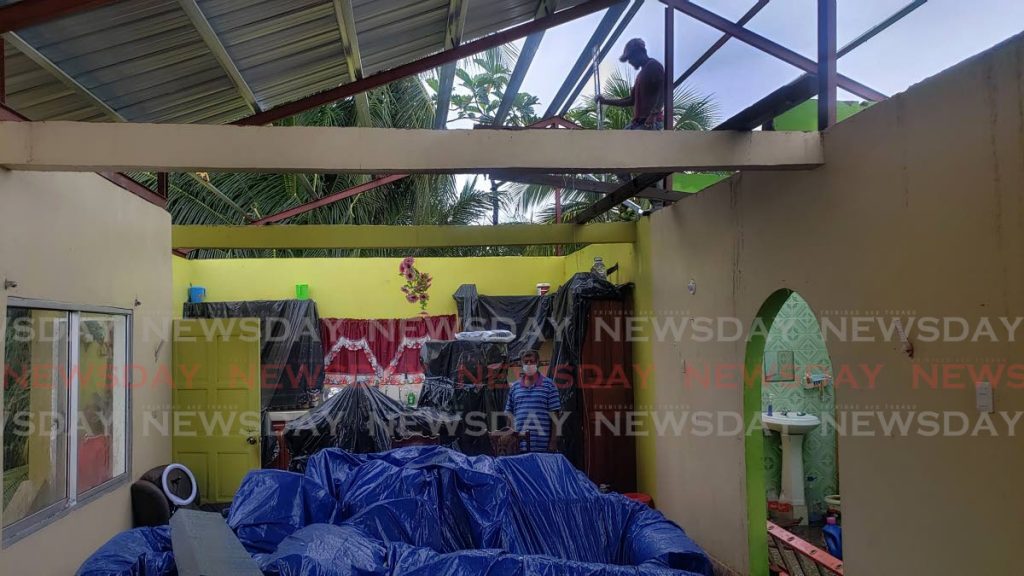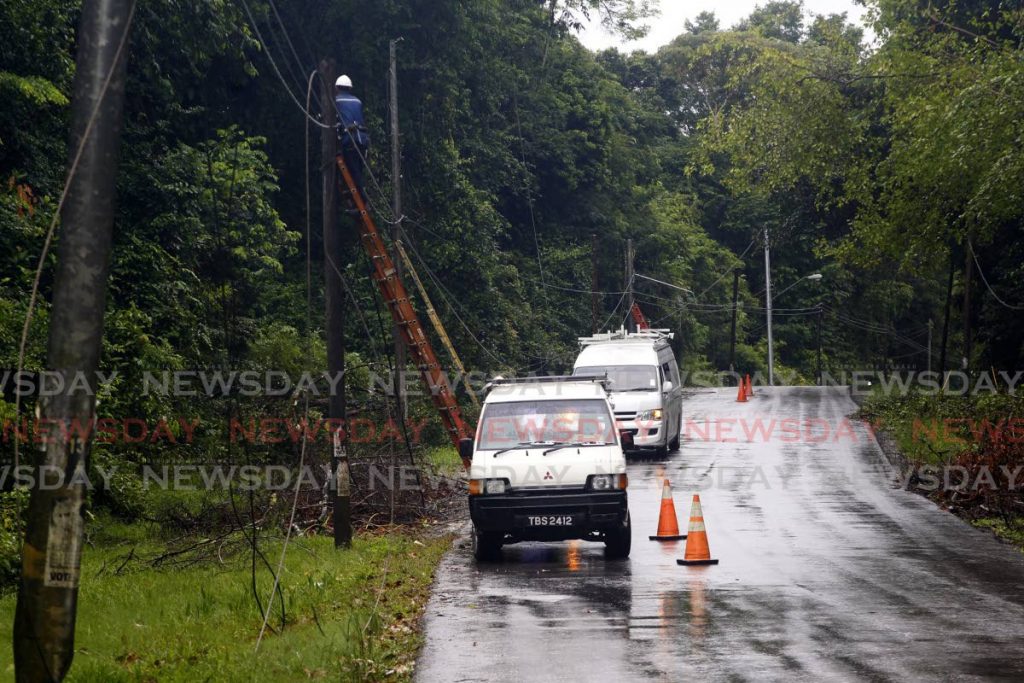Bad weather aftermath: Strong winds did most damage to houses

Most of the damage done by the recent adverse weather has been by the wind blowing roofs off houses and blowing over trees.
Senior disaster management coordinator for the Ministry of Rural Development and Local Government, Jerry David, told Sunday Newsday over 100 trees fell in the various regional corporations since Thursday.
He said response teams have been working in Sangre Grande, Diego Martin, Tunapuna, Point Fortin, and other areas to clear fallen trees off roads, off people’s homes and more. However, on Friday, heavy rain impeded the teams so they were not able to clear as many areas as they hoped but the work continued on Saturday and would continue on Sunday and during the week.
The teams were also currently doing damage assessments and needs analyses in Point Fortin.
“I suspect we will be engaging the National Commission for Self Help as a lot of people’s roofs were damaged or partially damaged.
“The sad part is that they will replace the galvanised sheeting in the same way without properly securing them and it will happen again.”
He advised that people sure up and secure the roofing at the four corners of their homes, and people with wooden homes should use hurricane straps, which cost $3 to $5 each, to secure the roof to the main building.
David said there were also a few incidences of trees falling on roofs.
“Trinis like to have mango, avocado, chenette and all kinds of fruit tress all around their homes not understanding that it is a hazard. If there are high winds branches could break and damage the house or it could blow a tree right onto your home.”
He added that termites often live underground and burrow into the roots and hearts of trees. They could also eat through wooden rafters and no sign would be visible on the surface. He suggested people check their homes and surroundings frequently for termites, especially if they see “rain flies” which were actually flying termites.
One of those affected by the recent high winds was 56-year-old Las Lomas father Bobby Reesal.
Reesal spent Friday night in a shed at the back of his home after winds blew the roof off the family’s home on Friday morning.
Speaking with Sunday Newsday, he said he could not estimate the damage but he may have to demolish his home and rebuild.
“Yesterday (Friday) morning the roof blow off and half of it by the neighbour. When that happen me and my son run out the house. We accustomed to wind blowing and hurricane alert, but this was different. I living in this area 56 years now and living in that house about 30 years now and nothing like this ever happened."

Reesal said he was contacted by the Chaguanas Borough Corporation but up to Saturday he had not been visited by anyone in authority including his Member of Parliament Dr Rishad Seecheran. Calls to the MP went unanswered.
He said his topless home was exposed to the rain on Friday and Saturday with all his belongings both upstairs and downstairs getting soaked. The few pieces clothing he managed to salvage were drying in the shed while some other small items were by his neighbours.
He hoped there would be no more rain on Sunday and he may get his wish as, on Saturday at 2.51 pm, the TT Meteorological Service discontinued the yellow level adverse weather alert issued by on Friday morning. However, it issued a yellow level hazardous seas alert at 3.30 pm for Sunday at 2 am to Friday September 10 at noon.
“North-easterly to easterly high energy swells are expected to impact near-shore areas along exposed coastlines of Trinidad and Tobago. These swells can result in higher surfs and occasional battering waves.”
The adverse weather also caused power outages and issues with the country’s pipe borne water supply and up to Saturday, public utility crews were still working on restoring those services.
In a release on Saturday, T&TEC said, “Whilst work continues unabated, there have been some delays caused by intermittent rain and fallen trees remaining in some locations. Significant progress was made overnight in most areas, however the Eastern area still has a large number of outages, particularly in Sangre Grande and Arima.”
It added that there would be delays in the call response of the company’s call centre because of the high volume of incoming calls.
It also listed several areas with widespread outages still to be addressed including Belmont, Maraval, San Juan, Biche, Piparo, Tabaquite, Claxton Bay, Carlsen Field, Carapichaima, Arouca, Guaico, Talparo, Valencia, Delaford, Idle Wild, Pentlands and Roxborough.
A WASA release issued on Saturday morning said as of 9 am several water treatment plants in Trinidad “continue to be impacted by power failure and turbid river conditions due to adverse weather over the past 36 hours.”
The affected areas included North Oropouche, Tompire, Matura, Aripo, Guanapo, Quare, Maturita Booster, Caura and Luengo and Naranjo WTPs in the north east; Tyrico, La Fillette, Blanchisseuse, Rincon and Las Cuevas WTPs in the north west; Biche and Guayaguayare WTPs, and Mayaro Wells # 8, 9 and 13 in the south; and Hillsborough West, Courland, Highlands WTP and Bacolet, Belmont and Adelphi Wells in Tobago.
It said WASA was working with T&TEC to restore power to the plants affected while river conditions had to normalise before the others could return to service.

Comments
"Bad weather aftermath: Strong winds did most damage to houses"